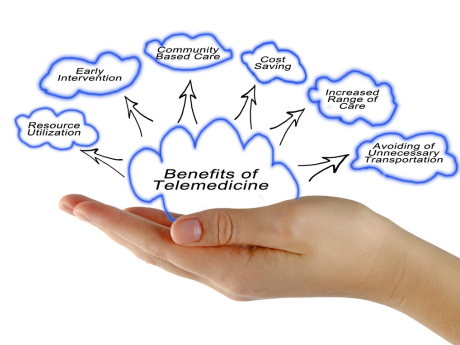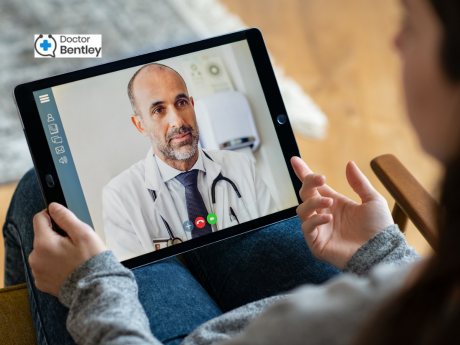The Benefits of Telemedicine: Why Online Healthcare Services Are on the Rise

Define Telemedicine and Online Healthcare Services.
Telemedicine, also known as e-medicine, usually refers to the delivery of medicine via telehealth services virtually. It utilizes telehealth technology for video calls, chats, and private messaging. It involves consulting with healthcare professionals and experts digitally without in-person visits. E-medicine is most frequently used for the proper analysis of a health disorder, its treatment, and medication. It’s a convenient way to access health consultants virtually in those specific situations where it’s hard to visit the doctor. Online telecare services involve a wide range of medical care facilities that can be accessed virtually. Online healthcare services include:
• Video Consultation
Patients can consult with healthcare experts through secure online video calls. These real-time video consultations are quite comfortable, as they give a sense of physical interaction with the healthcare provider.
• Voice Consultation
Patients who feel shy about communicating with the doctor via video calls can connect with the medical officer through voice calls over the phone.
• Protect Texting/messaging
Telecare services allow individuals to communicate with the doctor anytime through secure messaging. Patients can openly consult with the telecare provider for follow-up queries.
• Psychological Health Services
As remote services are specifically convenient for mental health consultations and therapies, Patients with psychological disorders can easily get access to psychologists for counseling.
After the COVID-19 pandemic, these telecare services are getting trendy and popular because of their convenience and accessible approach.
10 Key Factors of Telemedicine

The 10 key factors of telemedicine are as follows:
1. Virtual Consultation
2. Accessibility
3. Convenience
4. Money saver
5. Time saver
6. Privacy and encryption
7. Flexible follow-ups
8. User-friendly technology
9. Experts consultation
10. Digital monitoring
Virtual Consultation
Online medical consultation is telehealth communication via the digital web. Remote consultation is quite popular among those who feel shy and anxious about a physical checkup. E-medicine usually refers to remote consultation via telecommunication innovation. Patients can get access to professional healthcare experts digitally for the analysis of the disease, treatment, and then proper medication. It’s quite feasible to consult the medical officers without visiting any health care professionals. It is becoming more popular among those who are concerned with sexual health to book online doctor appointments.
Accessibility
One of the foremost benefits of telemedicine services is their accessibility. Individuals can get access to telemedicine services at their convenience. It goes way beyond geographical boundaries and logistic gaps, making it flexible for patients in rural and remote areas to communicate with health experts. Online health care platforms provide services in remote areas where there is no access to medical health facilities.
Convenience
Telemedicine services are convenient for patients, as they offer comfort by providing them with the facility to schedule appointments at their convenience. Telecare services reduce the hassle of traveling by providing online consultations. Virtual consultation is convenient for remote doctor services, as patients can contact the medical advisors anytime, anywhere, via mobile phones over the internet. It’s popular among working professionals who want consultation, saving both time and money.
Money Saver/cost Effectiveness
Telemedicine services exclude the cost of travel that patients generally require to reach the medical center. It can be more adaptable and affordable than physical appointments. In-person visits suffer from travel costs, hospital stays, facility costs, and administrative costs. For that reason, telemedicine is quite convenient and easy to afford.
Time Saver
Virtual appointments are time-saving services as it’s easier to get an appointment online compared to in-person visits. These remote consultations generally save on travel and the time it takes to reach the medical facility.
Privacy and Encryption
Telehealth services prioritize the privacy of individuals by securing their personal data that they share via video calls and messages. These services are absolutely confidential and safe.
Flexible Follow-ups
Telecare services provide flexible appointments for follow-ups by the comfort of your home. These services are highly remarkable for follow-up appointments to monitor the improvement and address its concerns.
User-Friendly Technology
Telemedicine requires a number of user-friendly technologies, like video conferencing portals and secure messaging, to connect with the patient.
Expert’s Consultations
Telecare provides the opportunity to consult with healthcare experts who are not available physically. By using telemedicine, you can get access to any healthcare professional around the globe without incurring the cost of travel.
Digital Monitoring
Digital monitoring, or remote monitoring, is a key factor in telemedicine as it allows healthcare consultants to monitor the health of patients virtually. It enables telecare providers to collect the vitals and symptoms of the concerned disease without in-person visits.
Telemedicine Future

The future of telemedicine services is expected to be more bright and convenient than today. With upgrading technology, it might integrate virtual reality, remote monitoring gadgets, and artificial intelligence. This actually means that patients will have more convenience in accessing highly professional care from experts. This will also play a crucial role in improving health initiatives globally. Overall, the future of telecare holds exceptional potential for transforming medical care and screening patients' outcomes. It is likely to expand beyond conventional health consultants. The future of telemedicine is likely to be classified by numerous trends and developments, such as:
• Its services are supposed to become vast and more developed with the passage of time, as it will encounter psychological health services, critical disease management, prophylaxis, and even operative procedures via remote robots.
• The comfort level of telehealth technology will improve with 5G connectivity.
• It is going to be more accessible for elderly people to get diagnosed virtually via telemedicine.
Telemedicine Scope

The scope of telemedicine is vast and expanding quickly, and it includes various services such as:
• Remote consultation
• Online monitoring
• Virtual healthcare visits
• Experts care
• Psychological health
• Secondary opinion
• Rural telecare
• Prevention care
• Telecare apps
• Research
Telecare allows patients to get access to healthcare from their comfort by booking online doctor appointments that will gradually be helpful in saving both time and money. As technology upgrades, the scope of telemedicine will grow continually, offering more innovative healthcare services.


